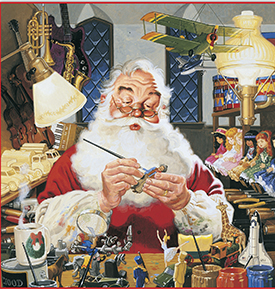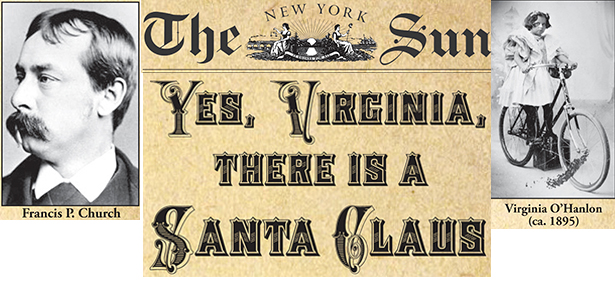Monthly Archives: December 2016
Tidbits to put you in the holiday spirit
The holiday season has arrived, and millions of people across the globe will be celebrating Christmas with their families and friends. The following are some interesting tidbits to share with your loved ones this holiday season.
• Each year, more than three billion Christmas cards are sent in the United States alone.
• In 350 AD, Pope Julius I, bishop of Rome, proclaimed December 25 the official celebration date for the birth of Jesus Christ. Many historians and theologians have surmised that Christ really wasn’t born this time of year, thanks to imagery and information from the Bible.
• Christmas carols began as an English custom called “wassailing.” Individuals toasted neighbors to a long and healthy life.
• Despite the common tale that three wise men paid homage to baby Jesus, the Bible never specifically calls out a number. Similarly, there’s no specific indication that they visited the infant Jesus. Their visit may have occurred when Jesus was older.
 • Santa has his own official postal code. It’s H0 H0 H0.
• Santa has his own official postal code. It’s H0 H0 H0.
• The song “Jingle Bells” was originally written for Thanksgiving and not Christmas. People loved it so much that the lyrics were changed to fit Christmas.
• Christmas trees typically grow for 15 years before they’re cut and sold. This means the trees sold today were likely planted in 1999.
• Christmas was not declared an official holiday in the United States until June 26, 1870.
• Before turkey, the traditional Christmas meal served in England was a pig’s head and mustard.
• Male reindeer tend to shed their antlers in the winter. This means Santa’s reindeer are likely female.
• Many people may be less inclined to stand under mistletoe waiting for a kiss if they knew what “mistletoe” means in the ancient Germanic language. It literally means “dung on a twig,” for the bird who eats the berries and then leaves seeds in droppings to propagate new plants.
• Each holiday season, PNC Wealth Management calculates the costs of the gifts in the song, “The 12 Days of Christmas.” The price index for the gifts went from $12,673 in 1984 to more than $24,000 in 2011.
The evolution and many faces of Christmas

Many people prepare for the arrival of Christmas months in advance. The first traces of wrapping paper and decorations arrive in stores as early as September, transforming the holiday into a much more secular celebration than its modest Christian beginnings.
Despite Christmas being an important date in the lives of today’s Christians, the holiday failed to gain prominent status until relatively recently. Research indicates that as late as the 19th century, Christmas was not even a legal holiday requiring a day off from work. That’s why 19th century readers of the classic Christmas tale, “A Christmas Carol,” were not shocked at Bob Cratchit having to work on Christmas Day. The United States Congress used to meet on Christmas Day because it was not a national holiday. In 1836, Alabama became the first state to officially recognize Christmas, but it didn’t become a legal holiday across the country until June 26, 1970.
Today’s Christmas celebrations include traditions from around the world. Some ascertain that it was the Church’s doing to schedule Christmas at a similar time to the pagan festivals, such as Saturnalia, that took place during the winter months. But many biblical scholars argue that this was not the case. Some pagan influences, such as holly and mistletoe as well as the burning of a yule log, have long been a part of Christmas traditions.
Santa Claus is one of the more recognizable symbols of Christmas. He is based on St. Nikolas of Myrna, an area that is part of modern-day Turkey. St. Nikolas is the world’s most popular non-Biblical saint and is one of the saints most portrayed by artists. Early depictions of St. Nikolas show him as a stern man who delivered his share of discipline. Eventually, those depictions changed to show a figure more associated with generosity. Throughout history there have been characters from around the globe, such as the Viking deity Odin, who were precursors to Santa Claus. Myth states that Odin rode his eight-legged flying horse in the winter. Odin gave out gifts to well-behaved children and punishments to those who misbehaved. Children would fill boots or stockings with treats for the flying horse.
 Regardless of the origins of Christmas, today it is hard to deny that Christmas is a commercialized success. It is a national holiday not only in the United States but also in other areas of the world, and it is best known for the tradition of giving presents to others. In fact, many people head to the stores well in advance of the Christmas holiday to purchase all of the presents on their shopping lists. The shopping season tradition may be traced back to the time of World War II, when it was necessary to mail gifts early to the troops serving in Europe so that they would be able to open them in time. Merchants realized that this concept could be used when gifting troops as well as private citizens, reminding shoppers to make their holiday purchases early so they could mail them to relatives near or far. As a result, the advanced shopping season was born.
Regardless of the origins of Christmas, today it is hard to deny that Christmas is a commercialized success. It is a national holiday not only in the United States but also in other areas of the world, and it is best known for the tradition of giving presents to others. In fact, many people head to the stores well in advance of the Christmas holiday to purchase all of the presents on their shopping lists. The shopping season tradition may be traced back to the time of World War II, when it was necessary to mail gifts early to the troops serving in Europe so that they would be able to open them in time. Merchants realized that this concept could be used when gifting troops as well as private citizens, reminding shoppers to make their holiday purchases early so they could mail them to relatives near or far. As a result, the advanced shopping season was born.
Although many people feel Christmas begins when the first bag of tinsel appears on a store shelf and ends when the last present is opened on Dec. 25, the true religious holiday does not coincide with merchant schedules. While most people are bustling to and from department stores and malls, Christians are participating in Advent, which was traditionally a solemn season of reflection and fasting. Christians are supposed to spend Advent preparing for the birth of Jesus Christ and the joy that ensues during the weeks leading up to Dec. 25.
Similarly, the joyous time of Christ’s birth is a day of celebration that does not end on Dec. 26 but continues for 12 days until the Epiphany, also known as Little Christmas, when Magi were reported to have visited the infant Christ and give him gifts. Although the more traditional day for gift-giving would seem to be on the Epiphany, by the time that day arrives many people have already taken down their Christmas decorations.
Christmas is a holiday steeped in many different traditions, and many people have their own ways of celebrating all through the month of December.
1897 Editorial

In 1897, Manhattan 8-year-old Virginia O’Hanlon wrote a letter to The Sun, a prominent New York City newspaper, asking a question that was on the minds of curious youngsters of her day, just as it continues to be today: “Is there a Santa Claus?”
One of the paper’s editors, Francis Pharcellus Church, took the opportunity to craft an eloquent and moving response that still inspires hope and faith more than a century later. The editorial — originally printed in the Sept. 21, 1897 edition of The Sun — is known as the most reprinted editorial ever to run in any English-language newspaper. It appears in its entirety below.
We take pleasure in answering at once and thus prominently the communication below, expressing at the same time our great gratification that its faithful author is numbered among the friends of The Sun:
“Dear Editor—
“I am 8 years old. Some of my little friends say there is no Santa Claus. Papa says, ‘If you see it in The Sun, it’s so.’ Please tell me the truth, is there a Santa Claus?
“Virginia O’Hanlon
“115 West Ninety Fifth Street”
Virginia, your little friends are wrong. They have been affected by the skepticism of a skeptical age. They do not believe except they see. They think that nothing can be which is not comprehensible by their little minds. All minds, Virginia, whether they be men’s or children’s, are little. In this great universe of ours, man is a mere insect, an ant, in his intellect as compared with the boundless world about him, as measured by the intelligence capable of grasping the whole of truth and knowledge.
Yes, Virginia, there is a Santa Claus. He exists as certainly as love and generosity and devotion exist, and you know that they abound and give to your life its highest beauty and joy. Alas! how dreary would be the world if there were no Santa Claus! It would be as dreary as if there were no Virginias. There would be no childlike faith then, no poetry, no romance to make tolerable this existence.
We should have no enjoyment, except in sense and sight. The external light with which childhood fills the world would be extinguished.
Not believe in Santa Claus! You might as well not believe in fairies. You might get your papa to hire men to watch in all the chimneys on Christmas Eve to catch Santa Claus, but even if you did not see Santa Claus coming down, what would that prove? Nobody sees Santa Claus, but that is no sign that there is no Santa Claus. The most real things in the world are those that neither children nor men can see. Did you ever see fairies dancing on the lawn? Of course not, but that’s no proof that they are not there. Nobody can conceive or imagine all the wonders there are unseen and unseeable in the world.
You tear apart the baby’s rattle and see what makes the noise inside, but there is a veil covering the unseen world which not the strongest man, nor even the united strength of all the strongest men that ever lived could tear apart. Only faith, poetry, love, romance, can push aside that curtain and view and picture the supernal beauty and glory beyond. Is it all real? Ah, Virginia, in all this world there is nothing else real and abiding.
No Santa Claus! Thank God! He lives and lives forever. A thousand years from now, Virginia, nay 10 times 10,000 years from now, he will continue to make glad the heart of childhood.
Liberty Lions poster contest winners

Each year, Lions clubs around the world sponsor the Lions International Peace Poster Contest in local schools and youth groups. The art contest encourages young people worldwide to express their visions of peace.
For more than 25 years, millions of children from nearly 100 countries have participated in the contest. The theme of the 2016-2017 Peace Poster Contest is “A Celebration of Peace.”
Students ages 11-13 were eligible to participate, and 129 Liberty Middle School art students participated under the direction of art teacher Elaine Snell.
This year’s Liberty Middle School Peace Poster Contest winners are, front row, from left: first-place winner Natalie Marcengill (8th grade), third-place winner Skyler Clayton (6th grade) and second-place winner Hannah Kelley (8th grade).
Back row: Snell, Liberty Lions Peace Poster Contest chairman Oscar Thorsland, LMS principal Dr. Tim Mullis and Liberty Lions Club president Jean Thomas.
Ghosts of Christmas Past tours planned at historic Hagood Mill
PICKENS — Local residents have an opportunity to experience a unique tradition of Appalachian Christmas.
These customs were derived from the old world, especially England, Scotland and Ireland. The lovely mountain setting of Hagood Mill provides the perfect venue for residents to “get into the spirit” of Christmas past. In Victorian England, it was a custom to tell ghost stories around the fire during the season. The celebration season stretched from the normal Christmas in December into January. These customs traveled across the Atlantic with the immigrants and into the Appalachian settlements.
This Christmas season, Hagood Mill will present the Blue Ridge mountain custom called “Ole Christmas” or “Breaking Up Christmas.” Each ghost tour is an evening walk through the little Appalachian settlement at Hagood Mill. Visitors will be standing at the very gateway to the Appalachian chain of mountain communities. Along the way, participants will be treated to ghost stories by the mill’s resident storyteller and folk historian, Dean Watson. Watson. a noted regional storyteller and folk historian. created the events and will share stories of the paranormal laced with tidbits of local history. Watson says the old Hagood Mill is one of the most haunted sites in Upstate South Carolina.
The tours are scheduled for Friday nights from 6 until 7:30 p.m. Jan. 6, 13, 20 and 27. Visitors are asked to wear warm clothes and comfortable shoes. A small flashlight may come in handy. The tours must be held to a maximum of 30 people. Pre-registration and payment are required prior to the night of the tour. No group tour rates are offered.
Guests can register online at visitpickenscounty.com/calendar for $12 for adults (16 and older) and $8 for children (7-15). There is no charge for ages 6 and under. Those interested can also call Hagood Mill at (864) 898-2936 to register. Registered participants will be notified online at the website if the tour has been cancelled or filled. If a tour is cancelled, the registration fee will be reimbursed. No reimbursements will be made the evening of the tour. In case of bad weather, tours will be moved from Friday evening to Saturday evening.
Delegation to meet in Six Mile
SIX MILE — The Pickens County Legislative Delegation will hold its annual public meeting at the community room at Six Mile Town Hall, located at 106 S. Main St., on Jan. 9.
Reports from organizations and boards will be heard starting at 5:30 p.m. The floor will be opened for public comments at 6 p.m.
The public is invited and encouraged to attend the meeting. Residents will have an opportunity to ask questions of and make comments to members of the Pickens County Legislative Delegation, and members of the delegation will comment on various issues that may be introduced in the upcoming session of the General Assembly, which convenes on Tuesday, Jan. 10.
The legislative delegation consists of Sens. Thomas Alexander and Rex Rice, and Reps. Joshua Putnam, Davey Hiott, Neal Collins and Gary Clary.
For more information, call (864) 850-7070.
Courier Community Calendar 12-21-16
• Pickens Lions plan meetings each month
The Pickens Lions Club is in need of new members. The club meets the first and third Thursday of every month at Pizza Inn in Pickens.
Courier Legals 12-21-16
The publisher shall only be liable for an amount less than or equal to the charge for the space of the item in error in the case of errors in or omissions from any advertisement, and only for the first incorrect insertion
Courier Notice to Creditors 12-21-16
The publisher shall only be liable for an amount less than or equal to the charge for the space of the item in error in the case of errors in or omissions from any advertisement, and only for the first incorrect insertion.
Courier Trespass Notices 12-21-16
In the state of South Carolina, trespass after notice is a misdemeanor criminal offense prohibited by section 16-11-620 for the South Carolina Code. Those who enter upon the lands of others without the permission of the owner or manager shall be deemed guilty of misdemeanor trespassing. All persons are hereby notified and warned not to hunt, fish, cut timber or trespass in any manner whatsoever upon the lands of the undersigned:



























